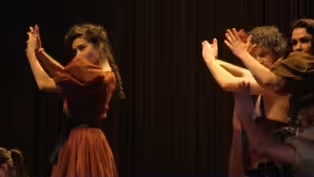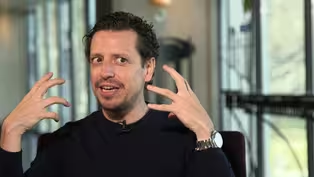
Antonio Najarro
Clip: Season 12 Episode 6 | 3m 36sVideo has Closed Captions
Choreographer Antonio Najarro | Episode 1206/Segment 3
Satori talks to choreographer Antonio Najarro Episode 1206/Segment 3
Problems playing video? | Closed Captioning Feedback
Problems playing video? | Closed Captioning Feedback
Detroit Performs is a local public television program presented by Detroit PBS

Antonio Najarro
Clip: Season 12 Episode 6 | 3m 36sVideo has Closed Captions
Satori talks to choreographer Antonio Najarro Episode 1206/Segment 3
Problems playing video? | Closed Captioning Feedback
How to Watch Detroit Performs
Detroit Performs is available to stream on pbs.org and the free PBS App, available on iPhone, Apple TV, Android TV, Android smartphones, Amazon Fire TV, Amazon Fire Tablet, Roku, Samsung Smart TV, and Vizio.
Providing Support for PBS.org
Learn Moreabout PBS online sponsorship- I'm excited to be sitting here with Antonio Najarro, who is the choreographer for the opera.
Welcome.
- Oh, it's a pleasure to be with you here.
- So how did you become part of this beautiful endeavor?
- So I had a phone call from Deborah Colker and I met her when I was directing the Spanish National Ballet.
And she came to Madrid with her dance company and she came to one of our rehearsal and we had a very good feeling.
We share very similar energies as choreographers and directors.
And she phoned to me and she told me I have a beautiful project, Ainadamar project, it's an Spanish history and I want you to be the Flamenco choreographer.
Because I think she felt that I could give the Spanish energy and Spanish soul through this opera.
And I said, yes, of course.
I love this challenge and that's why I'm here.
- And what did you find challenging?
- I think this opera is completely different to any other opera because there is a lot of Spanish spirit.
It's an opera with Spanish Flamenco rhythms in the music Spanish guitar, Flamenco guitar, percussion Flamenco percussion.
And also the treatment of the singers is not the same as in other operas.
They dance, they move, they do expression, traumatic expression.
And I think for me, this is the biggest challenge.
I treat the singers as real dancers and I'm loving to do that.
And I'm feeling that they love too.
- And what would you say Lorca's philosophy or what would you say the core of his message is?
- Lorca, he was, he loved the freedom and he speak about hope.
Hope of freedom, hope of light, hope of new vision of Spain, hope of new vision of his own life.
And Ainadamar speak about that.
- And why do you believe audiences should run to see this piece?
- Because this opera is emotion.
It's emotion, it's energy, it's tragedy, it's movement, it's soul, it's theater, but it's also dance.
It's also voices.
And I think when somebody pay a ticket to go to the theater, they want to feel something different.
They want to feel something different about his routine every day.
And Ainadamar will give something different to the audience.
- Is there anything that you want to say that I haven't asked you?
- I will like to say than I'm so happy with all the artists of this production because I found them completely open to understand and to feel my message.
The Spanish character, the Spanish dance, the Spanish culture.
And they are working very, very hard with a very good energy, with very good spirit.
And I'm feeling very comfortable.
I'm very proud of them.
- Thank you so much, Antonio.
It was a pleasure.
I learned so much from you.
- Thank you very much.
Curated by: Detroit Opera | 1206 Promo
Preview: S12 Ep6 | 30s | The life and death of poet and playwright Garica Lorca. (30s)
Video has Closed Captions
Clip: S12 Ep6 | 8m 48s | An interview with guest conductor Paolo Bortolameolli (8m 48s)
Providing Support for PBS.org
Learn Moreabout PBS online sponsorship
- Arts and Music
The Best of the Joy of Painting with Bob Ross
A pop icon, Bob Ross offers soothing words of wisdom as he paints captivating landscapes.













Support for PBS provided by:
Detroit Performs is a local public television program presented by Detroit PBS


